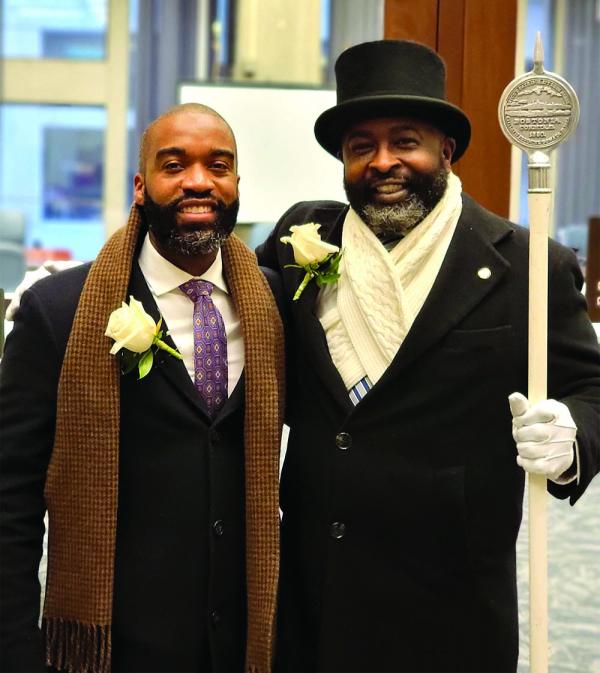February 2, 2022

District 4 City Councillor Brian Worrell

As Brian Worrell settles into his role as a newcomer on the City Council, his plan is to take what he has learned at every front door he knocked on in District 4 and bring that directly to the Council floor.
The 38-year-old Dorchester resident hit the ground running in late 2020 as one of the first candidates to declare for the seat soon to be vacated by Andrea Campbell, who was running for mayor, with a formula of service-first candidacy that developed out of necessity due to the continuing pandemic. The most recent event off that formula was a huge turkey giveaway on Thanksgiving and a door-to-door toy distribution on Christmas.
Since formally taking office on Jan. 3, Worrell said, his approach has continued to be shaped at the front doors throughout the district.
“It’s doing more of that community building, and showing people we care and are being supportive of families here, especially during Covid-19,” he said. “Any way we can be supportive, that’s what we want to do. When I was at the front doors during the pandemic, people wanted to feel their elected officials cared.”
He noted that this is the most diverse City Council in the history of Boston and that being a part of that so far has been surreal. “This council is the vision of other Black leaders before us; we’re their dream come to fruition,” he said.
Worrell is the first District 4 councillor from Dorchester’s west side of Washington Street. The seat was created in the 1980s, and previous councillors — Charles Yancey and Andrea Campbell — lived on the east side of Washington Street or in Mattapan. Worrell, a life-long resident of District 4, carries a history of the neighborhood with him that is unique in that he attended school in the suburbs, in his case, at Lincoln-Sudbury Regional High School as part of the METCO program.
He recalls coming home to Dorchester at a time when the neighborhood faced many more challenges than it does today. He remembers having to be home before the streetlights came on, and when going to the corner store, he had to travel in a group. An older cousin or aunt typically accompanied him.
With first-hand knowledge of where the district was, he said he knows where it needs to go. “Growing up like that, you normalize some things,” Worrell said. “I went to school in the suburbs and saw what my life was like and what my community was like. I got to see a sharp contrast. Some of my family members might have been locked up or been victims of homicide…A lot has changed. We’re not at those stages or that level of poverty and violence in our community. However, there is still so much to work on.”
Getting out into the district – showing up all the time – has been a hallmark of his candidacy and his early Council term. Worrell said he is comfortable in every corner of District 4, calling it his “hometown of Dorchester, USA.” With that long memory, he said, it will be important for him to embrace everyone in the district.
“I’d like to make sure that individuals that lived through these tough times in the past also reap these benefits and have a good quality of life,” he said. “I think we’re moving in the right direction.”
Right now, he said, the key issues he’s hearing a lot about are a new police commissioner — a search that’s underway, with two community meetings already held virtually — and police reform. Worrell was endorsed by the Boston Police Patrolmen’s Association (BPPA), one of the largest public safety unions in the city, and he also established great appeal in a majority-minority district with a strong voice on police reform issues. He said what he hears at the doors in District 4 isn’t a desire to defund, or get rid of, the police department, but rather to reform it by making officials and officers more about keeping the community safe than “policing” it.
“When I am knocking doors, the biggest thing I always hear is we need police reform,” he said. “I believe that reform is needed, and I will be leaning in on that. There’s also a need at the same time to help deter some of the issues we face. We need police presence to deter these issues. I honestly don’t like the term ‘policing.’…They aren’t policing the community, but they are there for the safety of the community. Most people I encounter believe in reform.”
By reform, he said, what he hears from residents is they’d like to see more Black and brown officers not only in the rank and file, but also in the command staff. Likewise, he said, people want an understanding of community policing and an alternative response to the things Boston Police often confront – such as mental health issues.
“They want to see someone that’s more supportive of responses where the only solution isn’t getting handcuffs on someone,” he said.
When he isn’t wearing his councillor’s hat, Worrell is a small business owner and a real estate professional, having graduated from Northeastern University with a degree in accounting and entrepreneurship. He said he’s building on Andrea Campbell’s legacy, especially regarding her push for the creation of wealth and opportunity through redevelopment of the many city-owned vacant lots in the district.
“What I’ve been hearing from the community and what I’d want to see is homeownership opportunities for everyone – from low-income to middle class,” he said. “Many in the community feel they are priced out at all levels. We would like to see those lots used for event spaces and sit-down restaurants, too. If we have a development going up on one of them, let’s get businesses or restaurants in place and put them in a position to get a liquor license so they can be successful.”
He added, “These vacant lots can do a lot for the community. Land is scarce. Once you build on it, that’s it.”
A third item he’s heard at the doors around the district is the need for high-quality schooling – with education in the district lining up with the jobs that are coming down the line, like biotech and climate resiliency positions. That is going to be a focus for his office, but, he added, the effort is going to have to start with the basics – notably reading skills.
“It starts with putting our students in a position to take advantage of these jobs,” he said, noting that he recently heard only one in four third to eighth grade Black students in Boston can read at grade level. “If our children can’t read, then we’re not going to be able to put them in a position to be in these programs tha twe as a city will be offering. We have to first make sure that our early childhood education is working. Reading is basic; it’s where we start.”
But for the most part, Worrell said, residents can expect him to take care of the simple things first, issues like streetlights, sidewalks, rodents, and community violence that often get forgotten amidst bigger systemic issues.
“Whatever I can do to show I listen and care, that’s what I’ll be doing,” he said. “If you can’t do the small things, it’s hard to do the big things…We all have big ideas and want change to happen, but it’s also essential to make sure you’re focusing on the quality of life for constituents.”


